#between belgium and netherlands 2024
Explore tagged Tumblr posts
Text
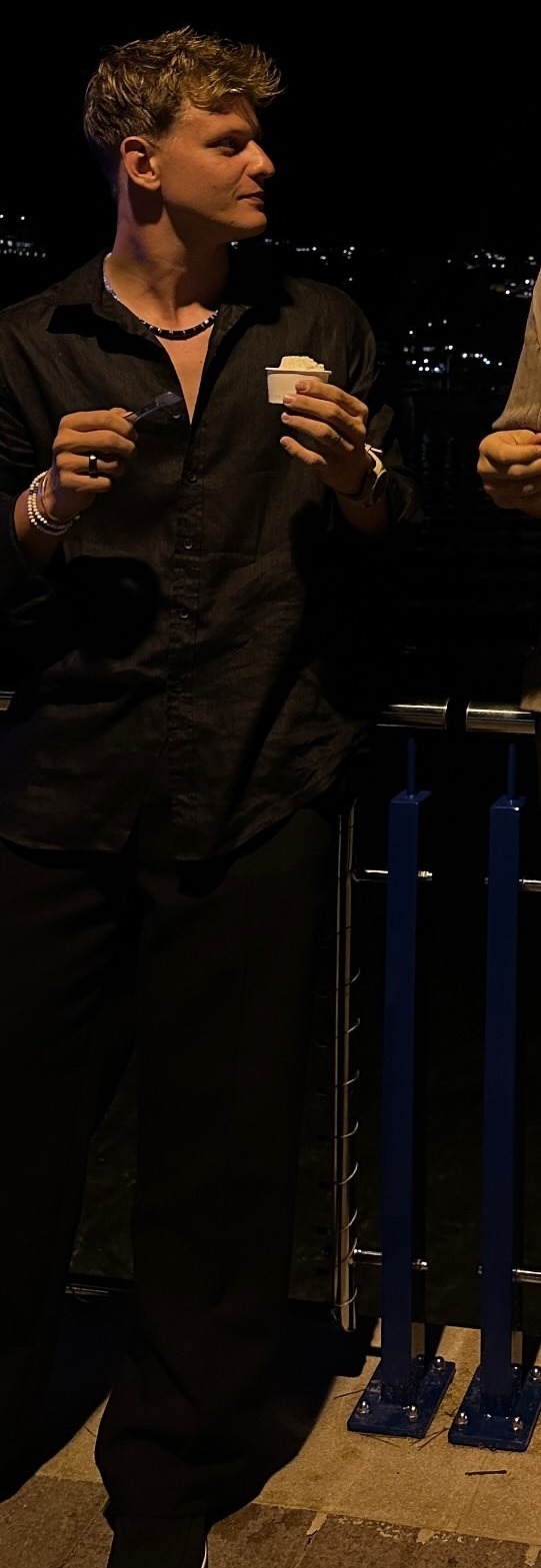

via lailahasanovic's ig story - august 15, 2024
#mick schumacher#f1#formula 1#fic ref#fic ref 2024#not a race#2024 not a race#between belgium and netherlands 2024#summer break#summer break 2024#tw food#cw food#wags
353 notes
·
View notes
Text



"Back at it again, in blue this time around" - september 21, 2024 📷 @.tommyhilfiger / instagram
#lewis hamilton#f1#formula 1#fic ref#fic ref 2024#not a race#2024 not a race#between belgium and netherlands 2024#summer break#summer break 2024#(note to self: hilfiger event in amsterdam w george and narea marti)
165 notes
·
View notes
Text
The Day Sebastian Vettel Decided To Retire From F1 — Then Annoyed Aston Bosses With Climate Campaign
Two years ago, Sebastian Vettel decided to bring an end to his glittering F1 career, so picked up the phone to Matt Bishop, then Aston Martin comms boss. He details the ensuing scramble and Vettel's increasing determination to speak out
Just over two years ago, on Wednesday July 27, 2022, I was forced to do something that I really hate doing: at the eleventh hour I had to cancel a long-standing dinner arrangement with my husband and two of our dearest friends, who live in New York and were on holiday in London for a week. The reason was that, at 5 pm that afternoon, I received a phone call from Sebastian Vettel telling me that he had decided to announce his retirement from Formula 1 in the Hungarian Grand Prix paddock the following day. I was Aston Martin's chief communications officer at the time, and, when something as big as that is sprung on a Formula 1 team's most senior comms/PR operative, he or she has to drop everything and focus on briefing colleagues in confidence, writing press releases, planning social media content, arranging press conferences, and formulating comms/PR strategies designed to optimise the management of a tricky news narrative that in this case would surely unfold rapidly, and perhaps also trickily, over the next 24, 48, 72, and 96 hours. I have written above that Vettel had "sprung" his decision on me, but, although the imminence of his announcement was a surprise, its content was not. Four months earlier you will recall that he did not travel to Jeddah for the Saudi Arabian Grand Prix, since he was recovering from a bout of Covid-19. His place was taken by Nico Hülkenberg, who, despite race-rustiness caused by his not having competed in F1 the previous year, did a typically excellent job.
Seb had made no secret of his disapproval of the Saudi regime when we had all gone there the first time, in December 2021, and, not surprisingly, in March 2022 rumours soon began to spread to the effect that he had invented a Covid-19 diagnosis so as to avoid racing there a second time. The truth was that he had indeed had Covid-19, and that he was indeed still unwell; however, was he disappointed to have had to skip the 2022 Saudi Arabian Grand Prix? No, he was not. Two weeks later, in Melbourne, he was back. On the Thursday before the Australian Grand Prix, in the Albert Park paddock, I gave him his comms/PR briefing, as was my habit on the Thursday before every grand prix. We discussed media matters of moment, including his not having raced in Jeddah. "The truth is that I was ill, honestly," he said, "but I admit that I don't like or approve of the country, so if I was going to have to miss a race because of Covid-19 that's probably the one I'd want to miss." He paused, smiled, and added, "I'm pretty sure I'm never going to race there again." Then and there I realised that 2022 would probably be his final season as an F1 driver. Not only was the Saudi Arabian Grand Prix going to be a fixture on the F1 calendar for years to come, but also one of Aston Martin's principal sponsors was Aramco, Saudi Arabia's state-owned national oil company. Missing that particular race without a 24-carat excuse would henceforth therefore be impossible for any Aston Martin driver. So, axiomatically, it followed that the only way he could make sure that he would never have to race there again would be to retire from F1 at the end of the year.
On the morning of Thursday, July 28, 2022, having worked until 3 am the night before, my comms/PR team and I issued a video in which our much loved four-time world champion announced his F1 retirement in his own words, and he posted it on his then brand-new Instagram channel at the same time. It included the following sentences, which he spoke with his usual eloquence: "I love this sport but, as much as there's life on track, there's also life off track. Being a racing driver has never been my sole identity. I want to be a great father and a great husband. I believe in change, and progress, and that every little bit you do can make a difference. We all have the same rights, no matter where we come from, what we look like, or whom we love. I'm an optimist and I believe that people are good, but, in addition, I feel that we live in very difficult times. How we shape the next few years will determine the rest of our lives. Talk is not enough. We can't afford to wait. I believe that there's still a race to win." The race to which he was referring was his growing and accelerating commitment to doing whatever he could to leverage his fame and popularity for the good of the inhabitants of planet Earth. That may sound grandiose, but it is also entirely valid. In the two years during which I worked with him, 2021 and 2022, we won awards for the inspirational way in which he did just that.
Just before the 2021 Styrian Grand Prix, helped by local schoolchildren, he created an F1 car-shaped 'bee hotel' at the Red Bull Ring. Three weeks later, straight after the British Grand Prix, in which he had raced hard for forty laps until his Aston Martin's Mercedes engine had terminally overheated, he led a group of volunteer litter-pickers to clear the Silverstone grandstands of the trash that irresponsible spectators had left behind. A month after that, in Hungary, infuriated by that country's new anti-LGBTQ+ legislation, he wore rainbow-coloured sneakers in the F1 paddock, and he donned a similarly hued T-shirt bearing the legend #SameLove as he took the knee on the grid before the race. Throughout the weekend he had talked to journalists and TV crews intelligently, thoughtfully, and compassionately on the subject of LGBTQ+ rights, equality, and inclusion. In May 2022 he visited and spoke inspirationally at HMP (Her, or now His, Majesty's Prison) Feltham, a young offenders institution in a suburb of west London, formally opening a new workshop in which the teenage inmates could learn how to become car mechanics as part of their rehabilitation. Immediately afterwards he and I took a South Western Railways train to London's Waterloo Station, sitting among regular commuters, so that he could spend time with the pupils of Oasis Johanna Primary School, which is in a disadvantaged part of inner London, and after that we went by Uber taxi to a church in Hackney, in the East End, where the BBC's prestigious political television talk show Question Time would be filmed. As the TV cameras rolled, he conversed fluently on the subjects of Brexit, the UK's cost of living crisis, the then-Prime Minister Boris Johnson's 'partygate' shenanigans, and even Finland's desire to join NATO, consummately out-arguing one of his fellow panellists, Suella Braverman, who was then the Attorney General for England and Wales and the Advocate General for Northern Ireland.
In addition, as the months went by, he continued to speak out in support of what he saw as humankind's collective global responsibility to address the climate crisis, doing so with increasing regularity, vehemence, and fearlessness, with the result that he began to irritate the very most senior people at Aston Martin, even though what he said tended to please most journalists and fans. "I don’t care," he said when he learned of his big bosses' disquiet. "I must do what's right." Behind the scenes what he did was perhaps even more admirable. F1 teams receive communications from troubled people all the time. You try to do what you can to help them, but sometimes their difficulties are of the type that human kindness alone cannot resolve. I am thinking of recently bereaved people, terminally ill people, profoundly disabled people, people with debilitating mental health issues, etc. Sometimes all you can do is send them a team cap signed by a driver. It is not much, and it breaks your heart that you cannot do more, but it is better than nothing.
Yet Vettel always tried to do more. On one occasion, I had been contacted by a young man who was deeply depressed. I told Seb about him, and he said, "Let's do a Zoom call with him." So I arranged it. I had thought that Seb might speak for five minutes or so, but no. He chatted animatedly for more than twenty minutes, with touching humility and heart-warming empathy, and I feel confident when I say that those twenty-odd minutes were significant in expediting the lad's mental and emotional recovery. A few months later, Seb hand-wrote the boy a four page letter. He gave it to me at a grand prix-I cannot remember which one-and he instructed me to post it on when I returned to the UK. I read it before I did so, and the tenderness and beauty of Seb's prose brought me to tears. There are many other examples of his remarkable generosity and sensitivity: too many to mention, in fact. This column has been about Vettel the man, not Vettel the driver. He was fast and clever in the cockpit, and I may well write about that side of him one day. I could write much more about Vettel the man, too, for I have dozens of stories that I could tell on that subject, because I worked very closely with him for two years and, more importantly, because he is a truly great man. In my long career I am lucky enough to have spent time in F1 teams with four world champions-Seb, Lewis Hamilton, Fernando Alonso, and Jenson Button-and they are all fantastic guys in their own, very different, ways. But, in my 61 years on this planet, I can state with confident and emphatic certainty that Sebastian Vettel, from the small town of Heppenheim, south-west Germany, is one of the most impressive people whom I have ever had the pleasure and honour to know, whether that be inside or outside F1. As he is fond of saying, "You can't always be the best, but you can always do your best." As a maxim to live by, it is hard to beat.
article by matt bishop
#sebastian vettel#f1#formula 1#fic ref#fic ref 2024#not a race#2024 not a race#between belgium and netherlands 2024#summer break#summer break 2024#fic ref 2022#2022 not a race#australia#australia 2022#australia 2022 thursday#between saudi arabia and australia 2022#between france and hungary 2022#hungary#hungary 2022#hungary 2022 wednesday#matt bishop
193 notes
·
View notes
Text

📷 @.miguelvazquez4 / instagram
#george russell#f1#formula 1#fic ref#fic ref 2024#not a race#2024 not a race#between belgium and netherlands 2024#summer break#summer break 2024#(note to self: ig post geotagged islas baleares mallorca)
172 notes
·
View notes
Text
Facebook ADs mini-essay by me <3 (excuse any typos and grammar mistakes, please. corrections are welcome.)
★ a huge shout out to Emma @dnpbeats for sending me a link to Phil's Facebook ad library. now we have a lot to go through ★
you can see that Phil's Facebook is linked with Dan's Instagram. Dan's, on the other hand, isn't.


note: filter goes from 2018 to 2024.
Terrible Influence (TI) youtube promo video "Finally Revealing Our Secret" is running as a bought ad in: Germany, Norway, Denmark, Sweden, Finland, France, Poland (if you search for it, the ad appears but it has reached just a few people in France and Poland; the locations of the ads are in Germany). we can see who paid for these ads (Bill Bailey)*.
no TI youtube promo video as an ad in countries with actual shows: Belgium (on a screenshot as an example), Netherlands, Iceland.
note: you can select any country and see if this ad reached anyone there. countries above are those that i selected because they either have shows or are very close to the ones with shows (France). i also selected Latvia - it didn't have this specific ad. it did have WAD premiere ads because WAD was targetting worldwide (spoilers, i guess).
nothing at all in the UK. it doesn't mean the ads are not running in the UK. i personally didn't see any, but if they are out there, they are probably bought by and run via a promoter (AEG; didn't see in their library) or someone else.
local TI promo posts are running as bought ads in the USA and Canada (screenshots below). Tysons as an example. there's no information about who paid for the ads.
local TI promo posts are running as bought ads in Australia and New Zealand. there's no information about who paid for the ads. but the ads are running on more platforms than in the USA, Canada and Europe.
local TI promo posts are running as bought ads in some European countries (more on that later).
on some screenshots you can see that Phil also has ads for WAD premiere and preshow (only in Europe, Canada and Australia/NZ). in EU we can also see who paid for them (Hangtime)*.
* i don't know how true this information is. i personally don't know about any connections between Dan and Phil and these people/companies. spoilers: local TI promo posts are paid for by A Comic Soul (in the EU), and in this case, we do know the connection. but more info about local TI promo posts will be in the reblog (because Tumblr limits, ya!)
shout out to Dan for having 0 ads in his Facebook library.
Europe:
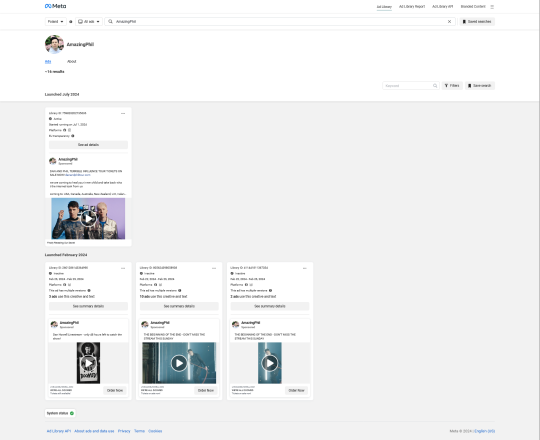
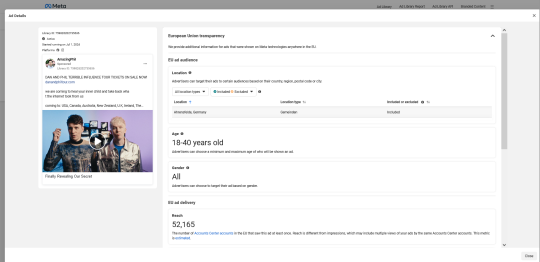
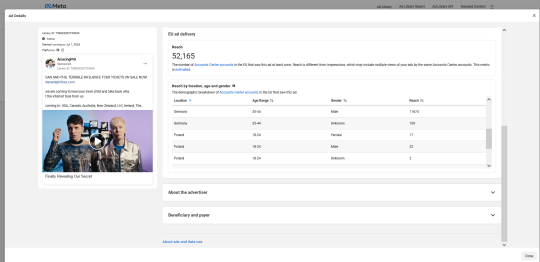
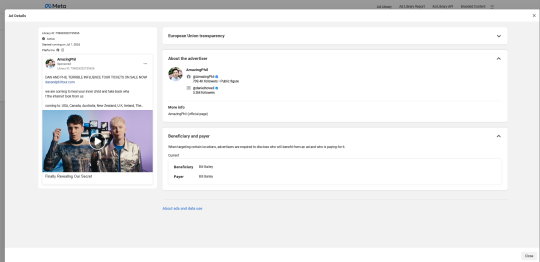

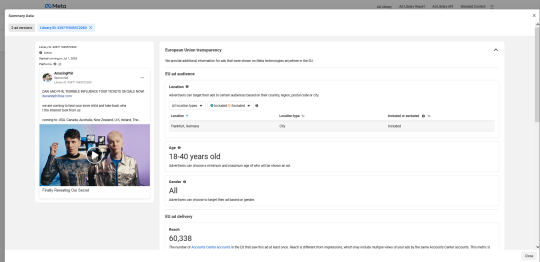
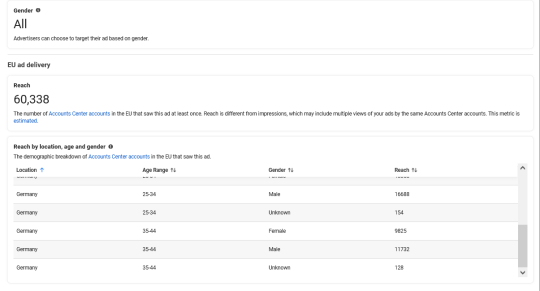
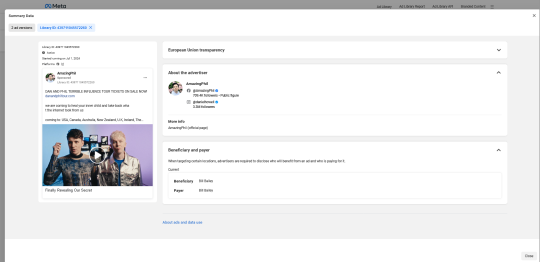

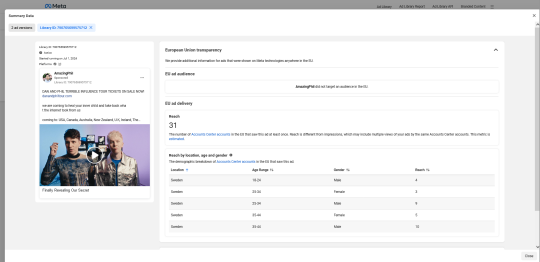
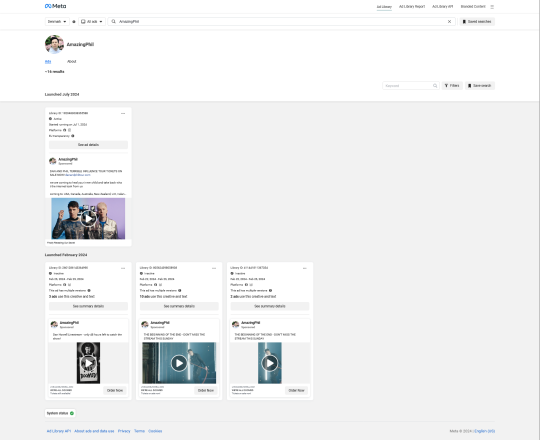
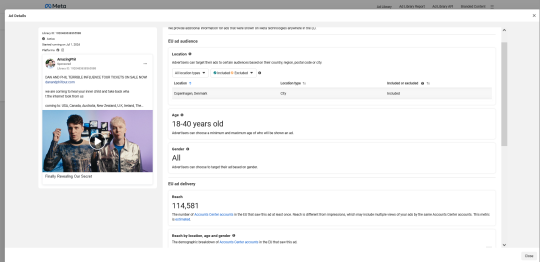
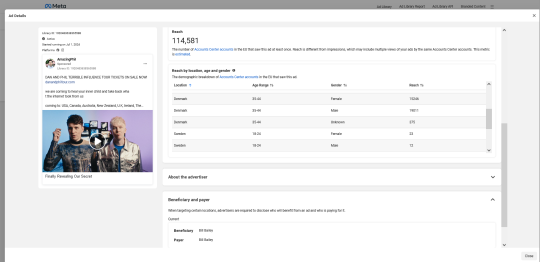

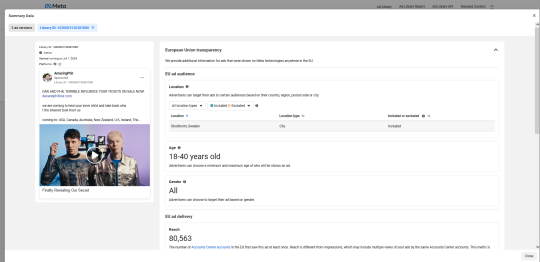

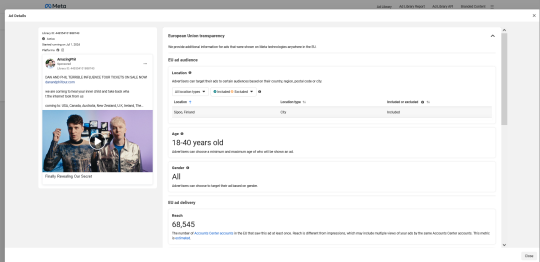
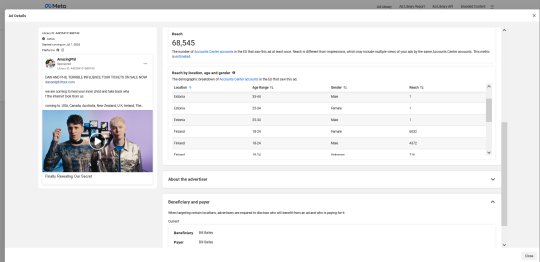
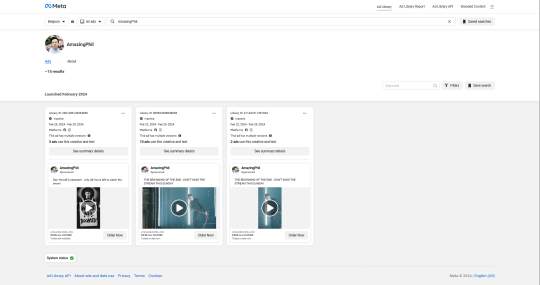
USA and Canada:

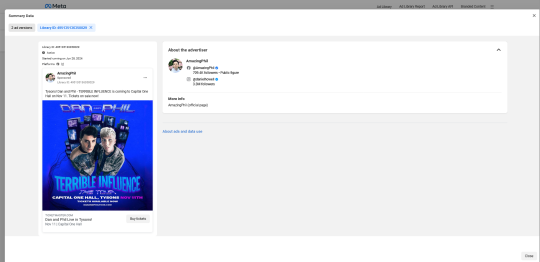

Australia and New Zealand:
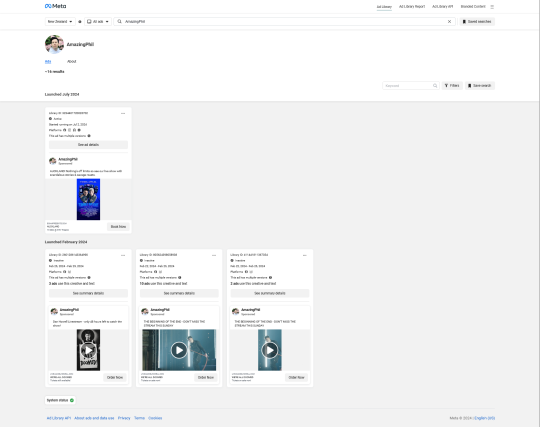


WAD premiere:
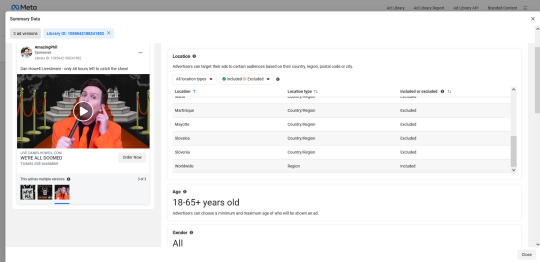

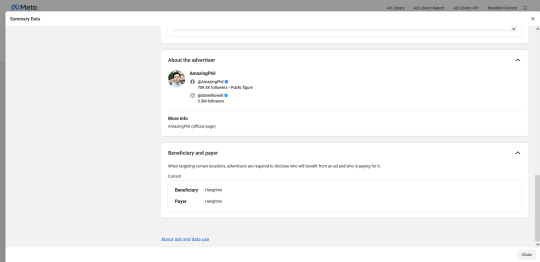
#ti promo#ti.usa#ti.europe#brother in christ i'm not tagging each us city. but all of them are there. and all canadians as well#facebook#ti.canada#ti.australia#ti.new zealand#wad premiere
26 notes
·
View notes
Text
Common sense is returning.
James Crisp, EUROPE EDITOR 13 April 2024

Dr Hilary Cass said children who think they are transgender should not be given any hormone drugs at all until at least 18 CREDIT: Yui Mok
Belgium and the Netherlands have become the latest countries to question the use of puberty blockers on children after the Cass Review warned of a lack of research on the gender treatment’s long-term effects.
Britain has become the fifth European nation to restrict the use of the drug to those under 18 after initially making them part of their gender treatments.
Their use was based on the “Dutch protocol” - the term used for the practice pioneered in the Netherlands in 1998 and copied around the world, of treating gender dysphoric youth using puberty blockers.
The NHS stopped prescribing the drug, which is meant to curb the trauma of a body maturing into a gender that the patient does not identify with this month.
In Belgium, doctors have called for gender treatment rules to be changed.
Research into impact
“In our opinion, Belgium must reform gender care in children and adolescents following the example of Sweden and Finland, where hormones are regarded as the last resort,” the report by three paediatricians and psychiatrists in Leuven said.
Figures from the Netherlands and the United Kingdom show that more than 95 per cent of individuals who initiated puberty inhibition continue with gender-affirming treatments,” the report by P Vankrunkelsven P, K Casteels K and J De Vleminck said.
“However, when young people with gender dysphoria go through their natural puberty, these feelings will only persist in about 15 per cent.”
The report was published after a 60 per cent rise in the number of Belgium teenagers taking the blockers to stop the development of their bodies. In 2022, 684 people between the ages of nine and 17 were prescribed the drug compared to 432 in 2019, the De Morgen newspaper reported in 2019.
Pressure is also building in the neighbouring Netherlands to look again at their use. The parliament has ordered research into the impact of puberty blockers on adolescent’s physical and mental health.
Dutch protocol
The Telegraph understands that the Amsterdam Center of Expertise on Gender Dysphoria, where the protocol originated, is set to make a statement on the use of puberty blockers next week.
“I too thought that the Dutch gender care was very careful and evidence-based. But now I don’t think that any more,” Jilles Smids, a postdoctoral researcher in medical ethics at Erasmus University in the Netherlands, told The Atlantic.
Attitudes in the Netherlands have hardened against trans rights, with a bill to make it easier for people to legally change their gender being held up in parliament.
The Cass Review said that the NHS had moved away from the restrictions of the original Dutch protocol, and researchers in Belgium have also demanded those restrictions be reintroduced.
Belgium is regarded as one of the most trans-friendly countries in Europe. A minister in the government is transgender and people have been able to legally change their gender without a medical certificate for the past five years.
But the hard-Right Vlaams Belang party is currently leading the polls ahead of national and European elections in June.
It has called for “hormone therapy and sex surgery to be halted for underage patients until clear and concrete research has been carried out.”
‘Greatest ethical scandals’
In March, a report in France described sex reassignment in minors as potentially “one of the greatest ethical scandals in the history of medicine”.
Conservative French senators plan to introduce a bill to ban gender transition treatments for under-18s.
On Monday, the Vatican’s doctrine office published a report that branded gender surgery a grave violation of human dignity on a par with euthanasia and abortion.
Finland was one of the first countries to adopt the Dutch protocol but realised many of its patients did not meet the Protocol’s strict eligibility requirements for the drugs.
It restricted the treatment in 2020 and recommended psychotherapy as the primary care.
Sweden restricted hormone treatments to “exceptional cases” two years later. In December, Norwegian authorities designated the medicine as “under trial”, which means they will only be prescribed to adolescents in clinical trials.
Denmark is finalising new guidelines limiting hormone treatments to teenagers who have had dysphoria since early childhood.
In 2020, Hungary passed a law banning gender changes on legal documents.
“The import and the use of these hormone products are not banned, but subject to case by case approval, however, it is certain that no authority would approve such an application for people under 18,“ a spokesperson told The Telegraph.
In August, Russia criminalised all gender reassignment surgery and hormone treatments.
#Belgium#Netherlands#cass review#Using caution when giving children hormones shouldn't have been controversial in the first place#Dutch protocol#Amsterdam Center of Expertise on Gender Dysphoria#Attitudes haven't hardened against rights for trans people the public just wants a common sense approach to the issue
44 notes
·
View notes
Text
Lewis holds the lap record in:
Saudi Arabia (Jeddah)
Japan (Suzuka)
Imola
Monaco
Hungary (Budapest)
The Netherlands (Zandvoort)
Singapore
Valtteri holds the lap record in:
Canada (Montreal)
Belgium (Spa)
Mexico (Mexico City)
Brazil (Interlagos)
Max holds the lap record in:
Miami
Spain (Barcelona)
The UK (Silverstone)
Qatar (Lusail)
Abu Dhabi
Between them that's 16 tracks, which is two-thirds (66.666....%) of the 2024 calendar. If you add Charles (Australia, Azerbaijan, Austin), you're up to 80%.
Not for any particular reason, just pointing it out.
(These are only the official track records as found on Formula One's website. I know that *actual* lap records are different.)
#also justice for valtteri he's a good driver c'mon#valtteri bottas#lewis hamilton#max verstappen#lap record#lap records#f1
19 notes
·
View notes
Text
Germany, UK join forces to tackle human trafficking across Channel
Britain and Germany pledged on Tuesday to share intelligence and expertise in the fight against gangs ferrying migrants across the English Channel in small boats, in the latest attempt by European countries to stop the dangerous journeys, ABC News reports.
Home Secretary Yvette Cooper and her German counterpart, Home Secretary Nancy Faeser, signed a “joint action plan” at a meeting in London. The UK said that under the agreement, Germany would make it a specific offence for Germany to facilitate the smuggling of migrants into the UK. Many of the rubber boats used to ferry migrants across the Channel are stored in Germany.
“The criminal gangs who organise dangerous small boats across the channel that undermine our border security, that put lives at risk, are also the same gangs that are operating in Germany, that are operating right across Europe and beyond,” Cooper said. “Law enforcement needs to operate across borders as well.”
Feser said co-operation would include “maintaining a high level of investigative pressure, sharing information as much as possible between our security agencies and continuously investigating financial flows to identify criminals operating behind the scenes.”
Both countries also said they would work to remove migrant smuggling material from social media platforms, where many smuggling gangs advertise their services.
The ministers signed the agreement ahead of a meeting in London of the “Calais Group” which includes Britain, Germany, Belgium, France and the Netherlands, as well as the European Union’s police and border services, Europol and Frontex.
The United Kingdom’s centre-left government is trying to rebuild law enforcement and intelligence links with the UK’s neighbours after the country leaves the EU in 2020. Brexit has complicated international co-operation by taking the UK out of Europol and the intelligence sharing mechanism.
Despite French and UK efforts to tackle migration, the trans-Channel route remains a major smuggling corridor for people fleeing conflict or poverty. Many migrants choose the UK because of language, family ties or perceived easier access to asylum and work.
This year, more than 31,000 migrants have crossed one of the world’s busiest sea routes, more than in the whole of 2023, although less than in 2022. UK officials say more than 70 people have died this year in attempts to cross the canal, making 2024 the deadliest year since the number of crossings began rising in 2018.
Read more HERE

#world news#news#world politics#europe#european news#european union#eu politics#eu news#germany#germany news#german politics#uk#uk politics#uk news#england#united kingdom#calais#nancy faeser#yvette cooper#human trafficking#migration#migrants#migración#immigrants#asylum seekers#illegal immigration
7 notes
·
View notes
Text
By: Ryan Burge
Published: Oct 3, 2024
Generating a graph that helps us understand the religious composition of just 18 countries is a Herculean task, as I found when trying to do just that with the Global Attitudes Project from Pew. In the United States, it’s pretty simple to throw together four or five categories that encompass almost all of our religious diversity - Protestant, Catholic, atheist, agnostic, or nothing in particular. Those five labels will fit at least 80-90% of the residents of most parts of the United States. Of course, there are outliers like Utah and its significant Latter-day Saint population. Yet, despite the fact that we have Lutherans in some parts and Southern Baptists in other areas - American religion falls into just a handful of broad categories.
When I went to try and visualize the religiosity of the countries that were included in this recent dataset that was published on the Association of Religion Data Archives (ARDA), I had to rethink how many categories were necessary and how many groups could just be combined into a “all others” category. This is my best attempt at that after writing about four hundred lines of computer code.

There is a lot going on in the world of religion when you compare just this dozen and a half countries. Of course there are many that are dominated by Protestants and Catholics. For instance, 96% of Poles say that they are members of the Roman Catholic Church, as do 67% of Italians and 61% of Hungarians. But there are also lots of Catholics in Spain (54%), Belgium (51%) and France (41%). On the other hand there is not a single majority Protestant country in this group of eighteen. Sweden comes the closest at 45%, and there are a few clustered around 25-30% (UK, Germany, Australia).
What about non-religious places? What is striking to me is how few of them have a big chunk of atheists - France leads the way at 26%, followed by the Netherlands at 22%. Yet, there are a lot that fall between 10% and 20% - UK, Sweden, Spain, South Korea, Italy, Germany, Canada, Belgium, and Australia. The number of agnostics in a country tend to be strongly related to the share who are atheists, too.
But then there are the outlier countries. For instance, 68% of Malaysians say they are Muslim. Nearly 90% of the country of Greece are part of the Orthodox Christian faith and 38% of the Japanese say they are Buddhists. And I would be remiss to not point out the incredible religious diversity of Singapore, where no religious group makes up more than 30% of the population. It’s 17% Protestant or Catholic, 21% Muslim, 29% Buddhist, and 23% non-religious. That’s a whole lot of larger religious groups at relative parity in terms of size.
But I wanted to move a step beyond that and focus on some other really intriguing questions about the role that religion plays in the personal lives of each respondent. And also how important they think religion is in terms of a well-functioning society. Let me start by showing you how people responded to the question, “How important is religion in your life?”

From this angle, Australia is the least religious country in the dataset. Nearly half of folks say that religion is “not at all important” (47%), but don’t miss out on Japan. While only 30% say that religion is not important at all, another 37% chose the “not too important” option. That puts it on par with Australia. Almost all the European countries fall between 30% and 40% on this metric. The country that is easily the most religious from this data is Malaysia with 84% of folks living there saying that religion is “very important” to them. That’s double the rate of the next country - Singapore where just 42% chose the ‘most important’ response option.
Of the eighteen countries in total, seven of them are more likely to say “somewhat” or “very important” than they are to choose the bottom two response options. There’s a nice mix of regions there, though. You have Italy and Greece, but also Israel, Singapore and Malaysia. It’s just not so simple to say that one region of the world is really religious - it very much matters what country we are talking about.
Let’s take this a step further by looking at this religious importance question through the lens of age groups. What I am really interested in is tracking how quickly religion will continue to decline in the future in countries outside the United States. So, I calculated the share of each age group in each country that said that religion was not important all.

One thing I can say without a doubt - older people put a higher value on religion compared to younger folks. You can see that by looking at the 65 and older group. In most countries, less than 20% of those people say religion is not important at all. When you look at the younger age group, you can see the overall percentages are a whole lot higher. Religion is clearly fading in a macro-level sense.
What also stands out to me is that there isn’t a huge jump from one age bucket to the next, it’s just a really incremental slide away from religious importance. For instance, in the Netherlands, the percentages go like this: 47% → 42% → 36% → 29%. Every successive age category is five or six points less likely to place no importance on religion. Generally speaking, the trend is maintained in this data. Inside each country, younger people are less religious than older people. It's just that the baseline tends to be different based on the overall religiosity of the country.
But to simplify this analysis, I wanted to show you the share who said religion is not important at all in the youngest age group and the oldest age group side by side per country. This really illustrates how much religion is declining across generations in some places.

One interesting observation: there are two countries in which the younger generation is actually more religious than the older generation. In Belgium, 32% of retired folks say religion is not important at all. It’s only 27% of people between the ages of 18-29 years old. Maybe there’s a religious resurgence in Belgium. That’s not something I have seen reported on by any outlets. Also, young Israelis are slightly more religious than the oldest Israelis. The difference here is just two percentage points, but it’s also worth noting that the country of Israel is a whole lot more religious than the average country in this dataset.
Which countries are experiencing huge drops? We have to talk about South Korea. Among South Koreans who are at least 65 years old, just 10% say religion is not important at all. Among the youngest adults in that country a whopping 42% place no importance on religion. That 32-point gap is the largest in the dataset. The other countries that have a huge generational gap are Japan at 25 points while Hungary and Spain are at 23 points.
What strikes me also is looking at the countries that are the least religious in the aggregate. Take note of Australia and Sweden. In both those cases, young adults are incredibly irreligious. But it’s not like the older generations in those countries are highly devout, though. For instance, 38% of Australians who are 65 years old or more say religion is not at all important. If you compared just the oldest Australians to the entire sample from every other country, they would only trail Sweden and the Netherlands for the mantle of ‘least religious.’ It’s quite stunning just how irreligious Australia is when looking at this data.
There’s another battery of questions in this data that I thought were incredibly telling about how people in these countries see the importance of religion to a functioning society. Respondents were asked how important a bunch of issues were to being good members of a society. There were questions about voting, reducing climate change, joining demonstrations, paying attention to current events, and getting the COVID-19 vaccine. I am showing you the share who said that each activity was very important across all 18 countries.

The activity that clearly scores at the top in most countries is voting. But there are others that also tend to do well. For instance, reducing climate change was seen as very important by huge chunks of folks in European countries like Belgium, France, Germany, Greece, Spain, and Italy. It’s fascinating to see which countries don’t put a ton of emphasis on environmental concerns. In Israel, just 28% of respondents said it was very important. There was also significant positive sentiment toward getting the COVID-19 vaccine. In most countries, a majority of folks said that being vaccinated was very important to being a good member of a society.
Where does regular religious attendance rank across these countries? In short - very low. There is a total of one country where it scores in the top 3 activities and that’s Malaysia, which as you can recall, was easily the most religious country in this survey. In many countries, the share who say church attendance is a vital part of being a good citizen is below 20%. In Japan it’s the absolute lowest at just 5%, followed by Sweden at 6% and Australia at 7%. It’s fair to say that they really don’t value religious service attendance in those countries.

Let me just zero in on that question about the role of church attendance in being a good member of society. This time I calculated the share of each country who said that religious attendance was not important at all. What we find here is pretty similar to the prior graph. Over half of Australians say that attending church is not at all important to being a good member of society, it’s 50% of Swedes and 45% of Spaniards. In fact, most European countries in this data score at least 40% on this metric.
The countries at the bottom of the graph are Malaysia and Singapore. I think it’s interesting to compare them to the country of Japan, which scores in the top five. Just because these countries come from the same broad region of the world doesn’t mean that they have the same general approach to religion. That’s also true when comparing a country like Poland to most of its European neighbors. Poland is still a strongly religious country - which stands in stark contrast to other countries in the region.
It’s always nice to broaden our perspective and try to understand the contours of religion outside the United States. There’s a clear sentiment in a lot of these countries that religion is just not an essential pillar to a functioning society. It ranks near the bottom when compared to things like staying abreast of current events or tackling climate change in a lot of countries in this dataset.
This data clearly points to the conclusion that in the case of almost all of these countries in the survey that they will continue to move away from religion in the decades to come. Young adults are much less religious than their parents and grandparents and generational replacement will continue to secularize these countries for the rest of the 21st century. Whether Belgium is just an outlier or represents a reversal of this trend, it is too early to tell.
==
Reminder: an "agnostic" is an atheist who won't admit they're an atheist.
#Ryan Burge#decline of religion#rise of the nones#irreligion#no religion#atheism#religion#church attendance#religion is a mental illness
8 notes
·
View notes
Text

"Our favourite kind of car shoot. 📸🤩" - august 7, 2024 📷 @.mercedesamgf1 / instagram
#mick schumacher#f1#formula 1#fic ref#fic ref 2024#not a race#2024 not a race#between belgium and netherlands 2024#summer break#summer break 2024#(note to self: no idea when actually shot)
79 notes
·
View notes
Text




lewis hamilton for elle brasil - 2024
#lewis hamilton#f1#formula 1#fic ref#fic ref 2024#not a race#2024 not a race#between belgium and netherlands 2024#summer break#summer break 2024#between japan and china 2024#(note to self: shot at rimowa event thing in seoul)
196 notes
·
View notes
Text
"Which superstar is behind 'Sebastian Sprater?' 🤔 🚵 A world-famous athlete is taking part in the Swiss Epic, the multi-day mountain bike race. But under a pseudonym. It is the 4-time Formula 1 world champion Sebastian Vettel. 🚵 Vettel finished the race through the Swiss Alps with his partner 'Maik Sparmann' in 129th place, a good 2 hours behind the winning team. 🚵 Of course, the former F1 star cannot contest such a race in complete anonymity, he knows that himself. Especially since Vettel recently competed in the Offroad Finnmark mountain bike race in Norway under the same pseudonym, as the Altaposten newspaper reported." - august 24, 2024 📷 @.srfsport / instagram
#sebastian vettel#f1#formula 1#fic ref#fic ref 2024#not a race#2024 not a race#between belgium and netherlands 2024#summer break#summer break 2024
69 notes
·
View notes
Text
spot the mistake challenge | grill the grid 2024, but it's just george - august 14, 2024
#george russell#f1#formula 1#fic ref#fic ref 2024#not a race#2024 not a race#between belgium and netherlands 2024#summer break#summer break 2024#grill the grid#grill the grid 2024#(note to self: no idea when actually shot)#with lewis#with seb#sergio perez#tw max#charles leclerc#carlos sainz#oscar piastri#lando norris#yuki tsunoda#daniel ricciardo#zhou guanyu#valtteri bottas#alex albon#logan sargeant#kevin magnussen#nico hulkenberg#esteban ocon
67 notes
·
View notes
Text
*YOU will need to be culled, especially if you are elderly. A 2015-2016 Event Timeline of various Psychological Operation Campaigns Laying the Ground for the Big Cull Oct 23, 2024
Sage Hana
5 mins agoAuthor
I have a post that I really need to finish.
It's a monstrosity going back to the timeline between Good Club, 2009, "Save the World" and the Staged Pandemic that was hatched, focused on the 2015-2016 timeline when CHD/ICAN were established as future firefighters for the fire that was coming.
At the same time, YouTube began promoting channels dealing with poverty and misery, (as predictively programmed with the Rockefeller and Kissinger/Nixon Depopulation/Zero Population Growth/ DAY TAPES engineered plans.)
Problem -Reaction-Solution.
Klaus was in 2009 warning about the endless "crises" which were basically explained in Day Tapes as WE CAN AND WILL DO THIS.
And that post just sits there like an albatross around my neck. A mess. Too complicated.
Renate Lindeman
Local Liberty Letter
Choosing death as a source of virtue signaling. Just look at the latest Hollywood programming "The room next door" that received a 17-minute standing ovation and where it was stated "There Should Be The Possibility To Have Euthanasia All Over The World".
In the Netherlands you can now romantically euthanize as a couple (duo-euthanasia); Belgium has NO age-limit; In Vermont you can order your euthanasia by phone and Canada tabled a bill where final consent is no longer required.
Euthanasia is the next safe and effective medicine for undesirables. Knock, knock. Who's there? The euthanasia team. But I didn't order euthanasia. Too bad, consent is no longer required.
7 notes
·
View notes
Text
Politico
European Greens Ask Jill Stein to pull out of US election to prevent Trump victory
November 1, 2024
By Jakob Hanke Vela and Zoya Sheftalovich
“The race for the White House is too close for comfort,” write parties from around Europe, calling on Stein to throw her support behind Democrat Kamala Harris.
Green politicians from across Europe on Friday called on U.S. Green Party presidential candidate Jill Stein to withdraw from the race for the White House and endorse Democrat Kamala Harris instead.
“We are clear that Kamala Harris is the only candidate who can block Donald Trump and his anti-democratic, authoritarian policies from the White House,” Green parties from countries including Germany, France, Denmark, Italy, the Netherlands, Ireland, Estonia, Belgium, Spain, Poland and Ukraine said in a statement, which was shared with POLITICO ahead of publication.
Stein is on the ballot in almost every critical U.S. state and polls between 1.1 and 1.4 percent, meaning her candidacy could cost Harris critical votes in the tight race for the White House.
“Right now, the race for the White House is too close for comfort,” the statement said. “We call on Jill Stein to withdraw from the race, and endorse Kamala Harris for the presidency of the United States.”
But with the election just days away — voters head to the polls on Nov. 5 — and the relationship between Europe’s Greens and Stein’s party strained, the plea seems unlikely to sway her.
Friday’s statement from the European Greens highlighted the “divergent values and policies” of the European and U.S. Greens, noting “there is no link between the two as the US Greens are no longer a member of the global organization of Green parties.”
The statement attributes the “fissure” to the American party’s “relationship with parties with authoritarian leaders, and serious policy differences on key issues including Russia’s full scale assault on Ukraine.”
Stein was criticized for attending a 2015 dinner in Moscow sponsored by Russian state television network RT, where she sat at the same table as President Vladimir Putin.
4 notes
·
View notes
Text
1 Nov 2024
US elections: European Greens call for Jill Stein to step down
On 5 November 2024 the world will be watching to see whether Americans choose Kamala Harris or Donald Trump to be their next president. Ahead of these pivotal elections, European Greens have called upon US Green Party candidate Jill Stein to withdraw her Presidential candidacy, and endorse Kamala Harris.
The stakes of these elections could not be higher.
Donald Trump has promised that if he becomes President again, he will extend abortion bans, deny members of the LGBTQIA+ community their rights, and deport migrants en masse. Like other ultra-conservative politicians across the globe with whom he has close relationships such as Vladimir Putin, Viktor Orbán, and Jair Bolsonaro he would undermine democracy.
The European Green family, made up of Green parties from across Europe, advocates for a politics that prioritises the planet, people and peace above corporate greed, systemic injustice, and violence.
We are clear that Kamala Harris is the only candidate who can block Donald Trump and his anti-democratic, authoritarian policies from the White House.
This election takes place at a watershed moment in the history of our planet. We face a climate crisis that is worsening every year, with heatwaves, floods, and a loss of biodiversity at a rate never seen before. Climate policies require democratic institutions, which we fear would be dismantled if Trump is elected.
On top of this, wars are raging and authoritarianism is growing throughout the world. In this crucial moment, Europe needs Kamala Harris as President of the United States, to be a reliable partner and to take the urgent, decisive action needed on the climate crisis, and to bring about a just and sustainable peace in the Middle East.
European Greens also highlight the divergent values and policies of themselves and Jill Stein’s US Green Party. There is no link between the two, as the US Greens are no longer a member of the global organisation of Green parties. In part this fissure resulted from their relationship with parties with authoritarian leaders, and serious policy differences on key issues including Russia’s full scale assault on Ukraine.
Right now, the race for the White House is too close for comfort. We call on Jill Stein to withdraw from the race, and endorse Kamala Harris for the presidency of the United States.
Mélanie Vogel, European Greens Co-chair and French Senator
Thomas Waitz, European Greens Co-chair and Austrian Member of the European Parliament
Groen - BELGIUM
Ecolo - BELGIUM
SF Green Left - DENMARK
Erakond Eestimaa Rohelised - ESTONIA
Vihreät - De Gröna - FINLAND
Les Écologistes - FRANCE
Bündnis90/Die Grünen - GERMANY
Irish Green Party / Comhaontas Glas - IRELAND
Europa Verde - ITALY
Partidul Verde Ecologist - MOLDOVA
GroenLinks - NETHERLANDS
Miljøpartiet De Grønne - NORWAY
Livre - PORTUGAL
Esquerra Verda - SPAIN
Miljöpartiet de gröna - SWEDEN
Grüne / Les Vert.e.s - SWITZERLAND
Zieloni - POLAND
Partija Zelenykh Ukrainy - UKRAINE
#vote blue#kamala harris#vote democrat#this is not the year for pretending we have a 3 party system#jill stein
4 notes
·
View notes